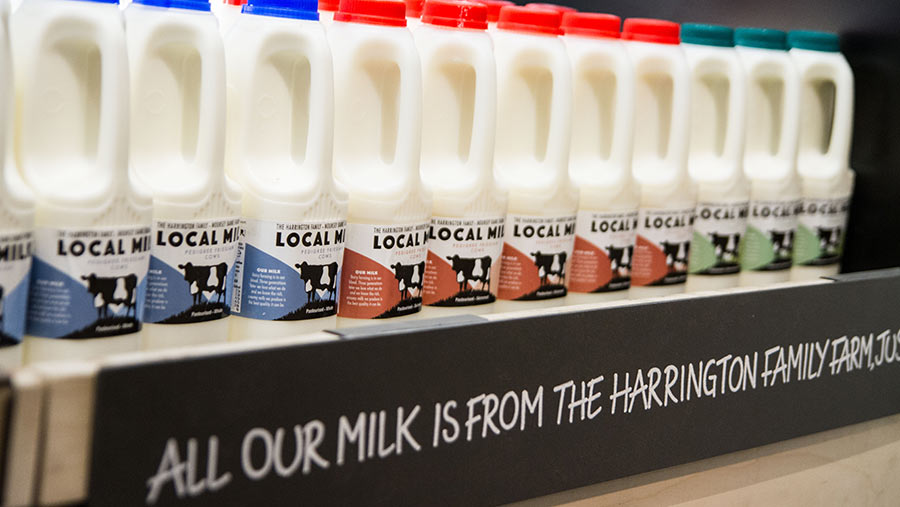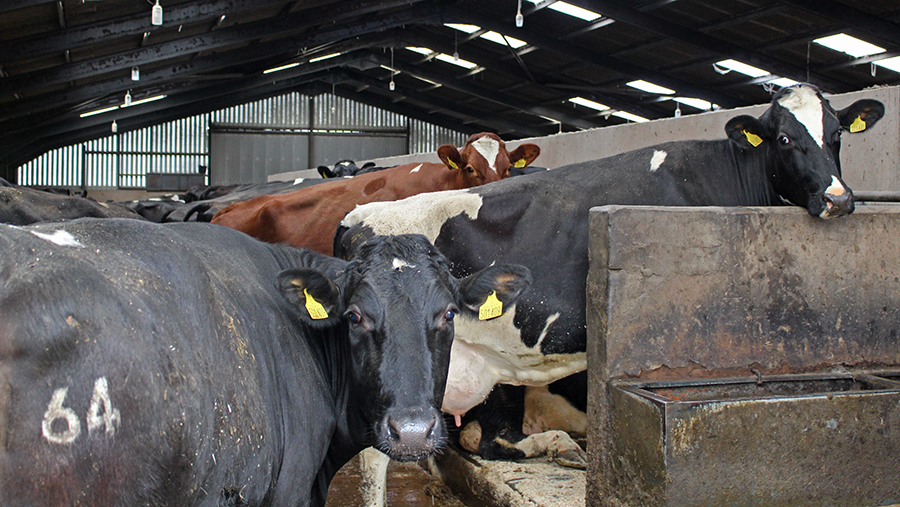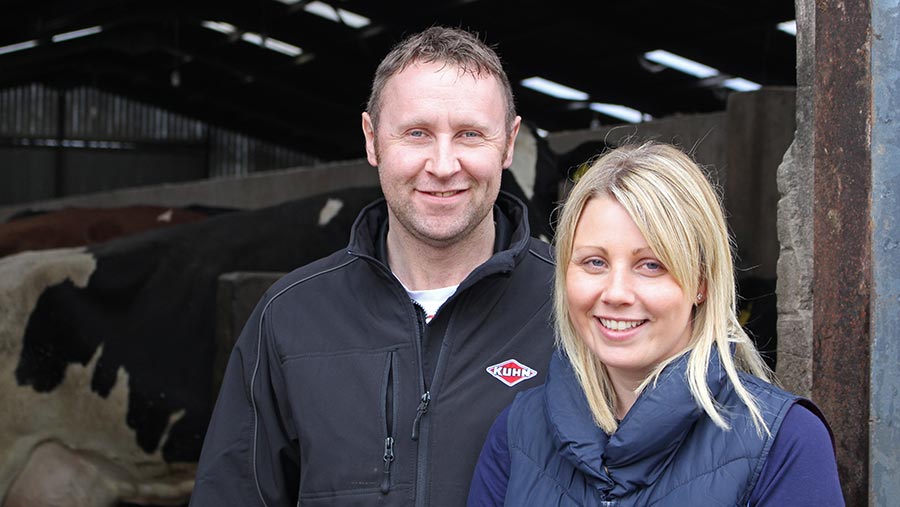Single source milk deal secures Cumbrian dairy farmer’s future

A demand for consistent milk qualities and high butterfat to make frothy coffees has opened the door to a new market for the Harrington family in Plumpton, Penrith.
Phil Harrington, who farms along with his wife Emma and parents Colin and Rosemary, teamed up with the Westmorland Family Group in October to supply milk to the company’s three Cumbrian businesses, which include a motorway service station, hotel and Rheged visitor attraction.
See also: How to guide to processing your own milk
The group, which prides itself on working with local enterprises, wanted to offer a single source of farm-assured, free-range milk to its customers that was of a guaranteed quality and fully traceable.
One of the main requirements was to have a herd that could supply a constant supply of quality milk throughout the year, with a bufferfat of 4.2%.
This is so the milk can be used for hot drinks and in the kitchen, as well as being sold in the shop bottled.
Mary Houston, head of kitchen offer at Westmorland Family Group says: “This isn’t just a marketing story for us.
“We wanted full transparency over that part of the supply chain. It is important for us to have direct dialogue with the farmer and support the industry.”
Ms Houston says the high butterfat is a requirement because they have found it has a frothing quality needed for coffees.
“It’s the consistency of the milk quality that’s important for us,” she adds.
The herd
The 140-cow pedigree Friesian herd at Mounsey Bank Farm was perfect for producing the volume of milk at the high butterfat required, with average yields of 8,000 litres at about 5% butterfat and 3.4-3.5% protein.
The cows, which calve all-year, are classed as free-range – which adds to the marketing message – because they are outside grazing for at least 180 days/year.

The milk is processed by North Lakes Foods, a relationship Ms Houston says has been vital to the scheme’s success.
“They helped identify the Harrington family and have been instrumental to it working,” she adds.
In order to guarantee the milk is from a single source, North Lakes Foods, who only have one tanker, collects the milk at 4am every day.
The Harringtons’ milk is then processed at the nearby plant in Penrith and bottled up for that day. The tanker then returns to the road to collect the milk from their other suppliers.
Phil Harrington says the partnership is offering more security to the third-generation family farm.
“It is more security because we have three outlets for our milk – the services, the hotel and Rheged,” he says. “If the milk price fluctuates, hopefully we will be able to hold more steady.”
Milk premium
The Harringtons have been selling all of their milk to North Lakes Foods for the past three years.
Although it is still sold to them, they are now getting a premium for the portion of the milk that is supplied to Westmorland.

On average, they are supplying 3,600 litres a week to the group. They are paid a standard price of 27p/litre plus an extra 1.98p/litre for quality (butterfat). They then receive a premium bonus from Westmorland for the milk supplied to them.
What Westmorland doesn’t use is then mixed in with the rest of the milk collected by North Lakes Foods and distributed to a range of outlets.
Keeping things simple
Mr Harrington says the Friesian breed is key to attaining the yields and also high butterfat and protein.
“We don’t push for litres and the cows are bred to produce quality. We use a Friesian stock bull, which we normally purchase from the Carlisle bull sale, but we don’t want him to be extreme. We tend to select him on eye and also his figures.”
The Harringtons don’t feed a lot of inputs to get the high butterfat and protein. During winter housing cows are fed home-grown silage, home-grown barley and some fodder beet.
“Our aim is to try and keep the feed wagons out of the yard,” says Mr Harrington. “We’ve saved £10,000 by not buying in feed this winter.”
Mr Harrington says that with Friesians feeding is a balancing act: “If you feed them too much, they will get too fat.”
Farm facts
- 140-cow herd of pedigree Friesians
- Farm 121ha, 20ha of which is tenanted
- Achieving standard milk price of 27p/litre with extra 1.98p/litre for qualities
- Supply on average 3,600 litres a week to the Westmorland Family Group for a premium
Grassland management
Grassland management is also key to maintaining yields and high butterfats. At grass, it is harder to maintain butterfat levels, so having a good grazing strategy to maintain intakes is vital, Mr Harrington says.
He aims to keep pastures young. “We reseed pastures every 6-7 years and put good-quality mixtures in that are high in clover. We also look for longevity when selecting a mix.”
Soil is also tested before applying nitrogen. He then applies a high-quality fertiliser and also slurry from the farm. Lime is also applied to the soil.
“We don’t buffer feed unless in extreme conditions. The only extra things we give are a pre-calving lick, a high magnesium lick and ad lib phosphorous.”
Cows are rotationally grazed throughout the summer before being housed in the autumn.
Cow management
All heifers are put in calf to an easy calving Angus, to reduce the stress at calving with the aim of calving down at 2.5 years. Heifers are averaging about 7,300 litres.
“This also gives us a product to sell. All dairy/beef cross calves are sold privately at weaning age,” he adds.
Bull calves also have a ready market and are all sold to a private seller.
